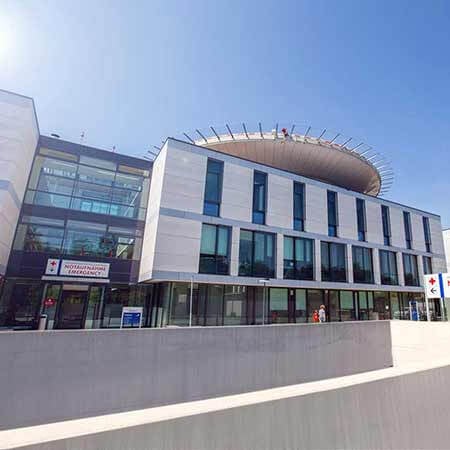Polycythemia vera is a myeloproliferative neoplastic disease caused by uncontrolled production of red blood cells. As a rule, the production of leukocytes and platelets also increases, although to a lesser extent. As a result, there is increased blood viscosity, a tendency to thrombosis, impaired microcirculation. Most patients with polycythemia vera suffer from headache, dizziness, and limping. They have an increased risk of thrombotic and thromboembolic complications. If this disease is diagnosed, you can receive treatment for polycythemia vera in Germany. Although the pathology is incurable, it can be controlled, achieving a high quality of life and minimizing the risk of severe complications.
Content
- Conservative therapy
- Surgery
Doctors use phlebotomy and drug therapy. In case of complications, operations and endovascular procedures are performed.
You can contact the University Hospital Mannheim, University Hospital Ulm or University Hospital Freiburg.
Booking Health will arrange your trip abroad: help you choose a clinic and treatment method, make an appointment without a long wait, help you get to the clinic and book accommodation, take care of applying for a visa and translation of medical reports, arrange medical insurance and solve all other issues.
Conservative therapy
Most patients are treated for polycythemia conservatively. Operations are required only in case of complications caused by impaired patency of the vessels of the spleen or liver.
Phlebotomy (blood drawing) is the main treatment for polycythemia vera. The purpose of the intervention is to reduce hematocrit – an indicator that reflects the blood viscosity. The target is 45%. In a hematocrit above 50%, the risk of complications increases sharply.
Phlebotomy is performed regularly. You cannot remove too much blood from a person at one time, as this is unsafe. As a rule, harvesting 500 ml lowers the hematocrit by 3%. So that the procedure does not lead to complications and deterioration of well-being, the blood is removed in an amount of a maximum of 1.5-2 units per week. One unit is 450 ml of blood. In women weighing up to 50 kg, elderly and debilitated patients, only 0.5 units of blood per week can be safely removed.
Phlebotomy allows the doctors not only to remove excess cells from the blood that are already produced by the bone marrow, but also inhibits its function. Doctors create an artificial iron deficiency in the body. As a result, erythropoiesis (the maturation of blood cells) is disrupted and the bone marrow produces fewer red blood cells. Due to the decrease in secondary stimulation, the production of leukocytes and platelets also decreases.
Drug therapy. Patients receive low doses of aspirin to prevent thrombosis. The exception are people with low platelets as a result of regular bloodletting. If the quantity of these cells is less than 1 million/μl, then aspirin is not prescribed.
Patients over 60 years with a history of thrombosis are at high risk. They additionally require cytoreductive therapy with hydroxyurea drugs. These drugs reduce the number of platelets in the blood, while not causing anemia and not significantly affecting the level of neutrophils (immune cells).
There are other drugs that reduce the level of platelets in the blood. They are prescribed in case of ineffectiveness or poor tolerability of hydroxyurea.
Since 2014, drugs from the JAK inhibitor group have been used as second-line therapy in Germany. Their cost is higher, but most patients achieve hematologic complete remission of polycythemia vera with these drugs.
Many patients suffer from pruritus. They are prescribed serotonin reuptake inhibitors and antihistamines. If these drugs do not work, then doctors in German hospitals provide second-line therapy with tumor necrosis factor-alpha inhibitors and JAK2 inhibitors.
Non-drug therapy involves lifestyle modifications that reduce the risk of complications of polycythemia vera. Patients are advised to normalize body mass, stop smoking and increase physical activity.
Surgery
A consequence of polycythemia can be the splenic infarction. If it is severe or repeated, then an operation is performed, namely a splenectomy. It involves the total removal of the spleen. In Germany, this is a minimally traumatic operation that is performed through a laparoscopic approach. This treatment option provides patients with a low risk of complications, facilitates rehabilitation and ensures good aesthetic results.
Another complication is hepatic vein thrombosis (Budd-Chiari syndrome). The following operations are performed for its treatment:
- transjugular intrahepatic portosystemic shunting (TIPS);
- portocaval, mesocaval, cavoatrial or mesoatrial shunting.
During these operations, doctors form a new way for the blood outflow, bypassing the thrombosed areas of the vessels. The differences between these operations are in the origin and destination of the created anastomoses (vascular connections). In some cases, German doctors perform endovascular procedures to restore the patency of blocked liver vessels. Such interventions are safe and minimally traumatic, as they are made through a small incision in the leg.
You can undergo diagnostics and treatment of polycythemia vera in Germany. You can expect that the disease will be completely controlled and will not lead to complications. If complications have already arisen, German specialists will quickly eliminate them, if necessary, using surgical methods or minimally invasive endovascular procedures. On the Booking Health website, you can check prices at different medical centers. Our specialists will help you select clinics in Germany and arrange your trip.
Authors:
The article was edited by medical experts, board-certified doctors Dr. Vadim Zhiliuk and Dr. Sergey Pashchenko. For the treatment of the conditions referred to in the article, you must consult a doctor; the information in the article is not intended for self-medication!
Sources:
National Center for Biotechnology
Web MD
UpToDate










